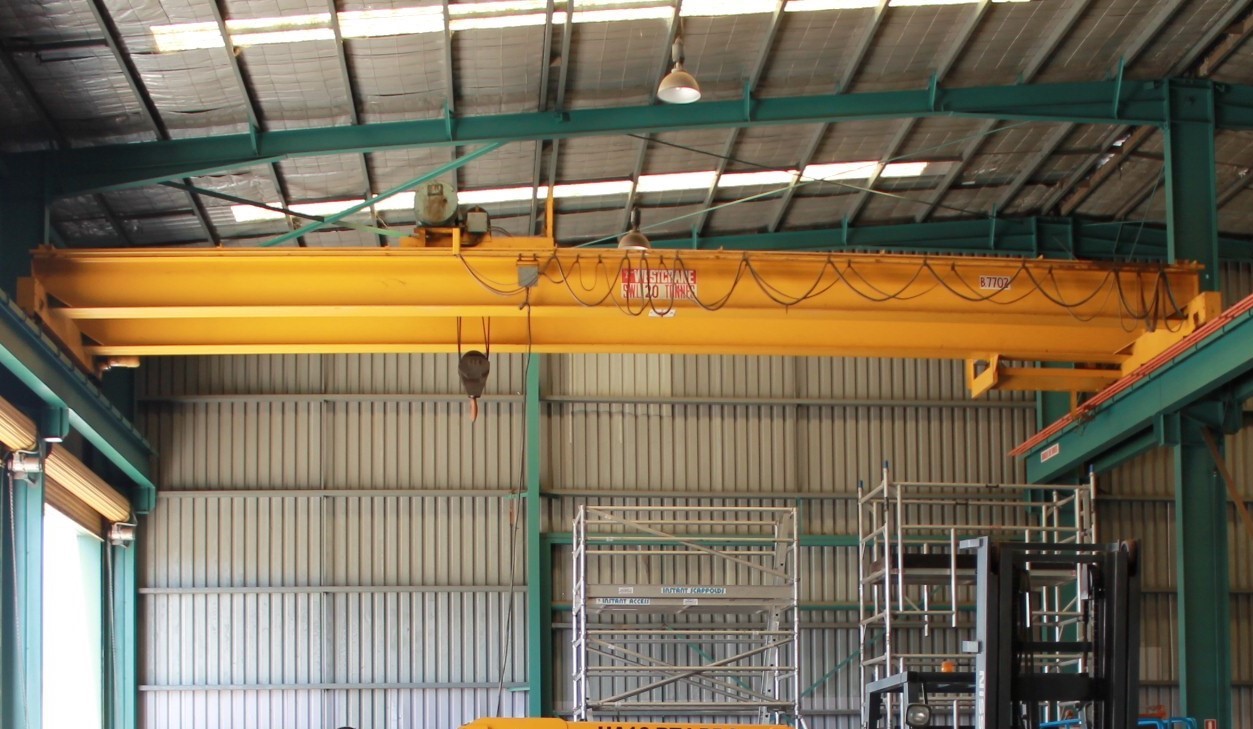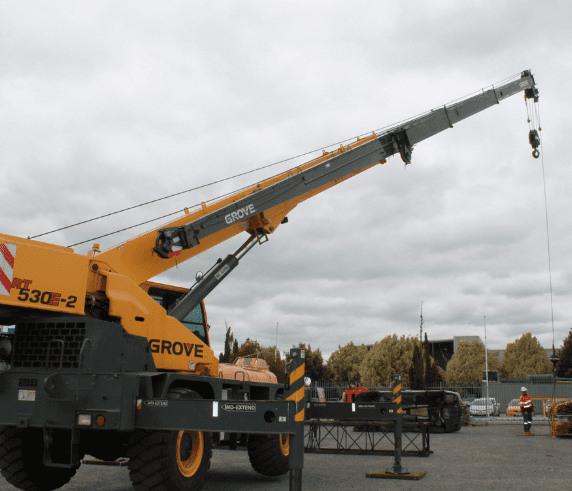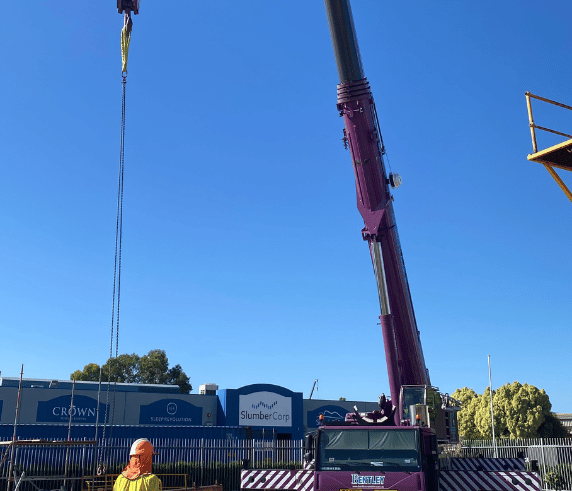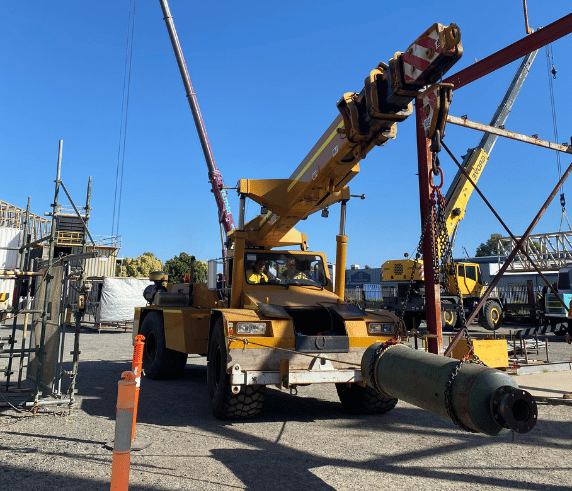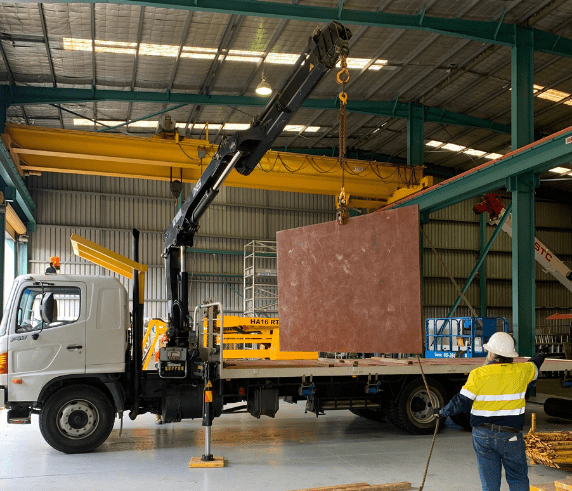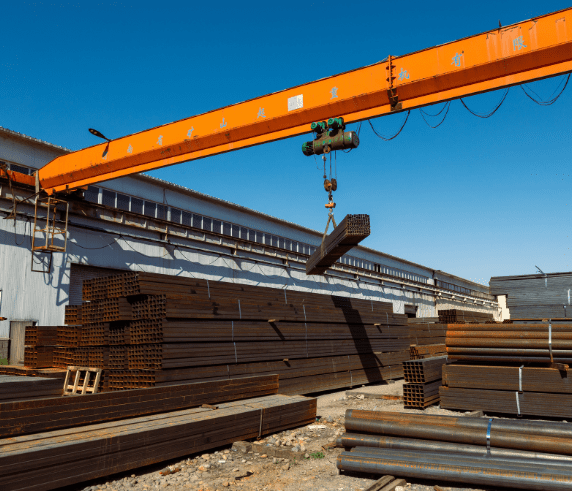All necessary requirements are detailed in the “Entry Requirements” section above. If you are unsure, please submit a ticket by clicking the “Enquire Now” button.
Bridge and Gantry Crane Ticket Course in Perth | CB Crane Licence Training
CB Crane Licence / TLILIC0016 - Licence to Operate Bridge and Gantry Crane [High Risk Licence]
Available Intakes
| Date | Time | Location | Available Spaces | Cost | |
| 10 - 12 March 2026 | 07:30 am - 05:30 pm | 107 Radium Street Welshpool | 8 | $2,000.00 | |
| 24 - 26 March 2026 | 07:30 am - 05:30 pm | 107 Radium Street Welshpool | 6 | $2,000.00 | |
| 14 - 16 April 2026 | 07:30 am - 05:30 pm | 107 Radium Street Welshpool | 8 | $2,000.00 | |
| 28 - 30 April 2026 | 07:30 am - 05:30 pm | 107 Radium Street Welshpool | 8 | $2,000.00 | |
| 12 - 14 May 2026 | 07:30 am - 05:30 pm | 107 Radium Street Welshpool | 8 | $2,000.00 | |
| 26 - 28 May 2026 | 07:30 am - 05:30 pm | 107 Radium Street Welshpool | 7 | $2,000.00 | |
| 2 - 4 June 2026 | 07:30 am - 05:30 pm | 107 Radium Street Welshpool | 8 | $2,000.00 | |
| 9 - 11 June 2026 | 07:30 am - 05:30 pm | 107 Radium Street Welshpool | 7 | $2,000.00 | |
| 23 - 25 June 2026 | 07:30 am - 05:30 pm | 107 Radium Street Welshpool | 8 | $2,000.00 | |
| 7 - 9 July 2026 | 07:30 am - 05:30 pm | 107 Radium Street Welshpool | 8 | $2,000.00 | |
| 21 - 23 July 2026 | 07:30 am - 05:30 pm | 107 Radium Street Welshpool | 8 | $2,000.00 |
Bridge and Gantry Crane Ticket Course in Perth | CB Crane Licence Training overview
This course equips participants with the skills and knowledge to safely operate bridge and gantry cranes in Perth. The TLILIC0016 – Licence to operate a bridge and gantry crane is a key component of earning your Bridge and Gantry Crane Ticket Licence. However, completing this unit alone does not grant a High-Risk Work Licence (HRWL); participants must already hold a current Statement of Attainment and HRWL for CPCCLDG3001 – Licence to Perform Dogging before enrolling.
Participants must hold a current Statement of Attainment/Qualification and High Risk Work Licence for CPCCLDG3001 – Licence to Perform Dogging prior to attending this course.
- Bridge Crane: Features a bridge beam or beams on end carriages, moving along elevated runways with a traversing hoisting mechanism.
- Gantry Crane: Has a bridge beam supported by legs on end carriages, travels on surfaces or decks, and includes a crab with hoisting units.
- This unit applies to operating bridge or gantry cranes controlled from a cabin/control station or remotely, with more than three powered operations.
Students will acquire both theoretical knowledge and practical skills to operate bridge and gantry cranes effectively, including:
- Plan Work/Task: Identify requirements, inspect the work area, assess the operating surface, determine crane capacity and load limits, apply hazard controls, follow traffic plans, establish communication, and confirm task details.
- Prepare for Work/Task: Consult personnel, implement risk controls, access and check the crane, set up and rig it properly, perform operational checks, review the crane logbook, assess weather conditions, calculate load weight, select lifting points and gear, and prepare the load destination.
- Perform Work/Task: Ensure lifts stay within crane capacity, position the hook block, connect and use lifting gear safely, conduct a test lift, transfer loads per procedures, monitor crane movements, follow communication signals, lower and land loads safely, and prepare gear for the next task.
- Pack Up: Park and secure the crane, stow gear, apply locks and brakes, shut down securely, and perform post-operational checks.
Accredited Units
Participants will be enrolled in the following units for Bridge and Gantry Crane Ticket Perth…
Entry Requirements
To join the Bridge and Gantry Crane Ticket Perth..
Students must hold a Dogging/Dogman qualification (High Risk Work Licence and Statement of Attainment/Certificate for CPCCLDG3001 – Licence to Perform Dogging) before commencing the CB Crane course with Saferight. If your High Risk Work Licence has not yet been issued, a current Notice of Assessment (NOA) will be accepted as evidence of eligibility.
- Must be 18 years old and above
- Present a valid photo I.D. on arrival
- Have a USI (Unique Student Identifier)
- Complete the Language, Literacy, and Numeracy (LLN) Assessment. If you have any concerns about your LLN skills, we encourage you to contact us before enrolling.
- If you have any physical conditions that may affect your ability to complete a course, please visit a doctor and obtain a “Fit for Work” certificate, and send it to our bookings email.
- Individuals holding a student visa are not eligible to enrol in, participate in, or attend this course, whether face-to-face or online, as Saferight is not registered with CRICOS (Commonwealth Register of Institutions and Courses for Overseas Students). Student visa holders are encouraged to seek training with a CRICOS-registered institution to meet their requirements. For more information please click here.
Assessment
Assessment for Bridge and Gantry Crane Ticket Perth / CB Crane Ticket Perth…
- Theory Component: Assesses knowledge of safe crane operation.
- Practical Component: Evaluates hands-on skills in operating bridge and gantry cranes.
If you already have a Bridge and Gantry Crane ticket and only need a Verification of competency, A VOC for Bridge and Gantry Crane is available at Saferight. For more information, please visit our VOC Bridge & Gantry course.
Certification
On successful completion of this course, students will receive a:
- Nationally Recognised Statement of Attainment for TLILIC0016 – Licence to operate a bridge and gantry crane
This is required to apply for a Bridge and Gantry Crane Ticket Licence.
The Unique Student Identifier (USI) must be supplied and verified prior to issuance.
Amenities
- COFFEE TRUCK available from 9:00am to 9:30am.
- LUNCH TRUCK available from 12:00pm to 12:10pm.
- RADIUM LUNCH BAR is less than 1 minute up the road from the Welshpool premise.
High Risk Work Licence
Disclaimer: Competence in this unit does not in itself result in a High-Risk Work Licence (HRWL) to operate this equipment or perform this skill. The course price listed excludes HRWL application fees.
A High Risk Work Licence (HRWL) is a photo ID issued to those trained and assessed as competent for high-risk.
Saferight can assist you with your High Risk Work Licence (HRWL) applications to WorkSafe. Please follow the instructions below when enrolling through our website, based on your specific needs:
For New HRWL Applications
- Select “High Risk Work Licence (New)” and “Photo (6x)” during the enrolment process.
- Important: You must select the “Photo (6x)” option when applying for a new HRWL. If you forget to select the photo option, the charge will be added manually when you attend the training.
For Transferring an Existing HRWL
- Select “High Risk Work Licence (Transfer)” and “Photo (6x)” during the enrolment process.
- Important: You must select the “Photo (6x)” option when applying for transferring a HRWL. If you forget to select the photo option, the charge will be added manually when you attend the training.
For Adding a New Class to an Existing HRWL:
- Select “High Risk Work Licence (Adding a Class)” during the enrolment process.
-
- Note: If you’re adding a class to an existing HRWL, you do not need to select the “Photo (6x)” option.
If You Want to Handle Your HRWL Applications Yourself:
- Simply proceed with your enrolment without selecting any of the HRWL options. This allows you to manage your HRWL application independently.
-
- For detailed guidance on applying for a new HRWL yourself, please visit: https://www.commerce.wa.gov.au/worksafe/apply-new-high-risk-work-licence-0
- To add a new licence class to your existing HRWL yourself, please visit: https://www.commerce.wa.gov.au/worksafe/add-class-your-high-risk-work-licence
Duration
3 Days (7.30AM – 5.30PM)
Delivery Locations
This course is delivered at the following location…
Fees
Refer to the price listed in the enrolment table.
Group bookings/Onsite training is available at your site or ours. Please click the ‘Enquire Now’ button for further information on pricing and site requirements for the Bridge and Gantry Crane Ticket Perth WA course. For our cancellation and refund policy, please refer to our Refund/Cancellation Policy.
Next Steps
DISCLAIMER
We offer Certificate IV in Training & Assessment qualification now. Click here for more details.
Available Intakes
| Date | Time | Location | Available Spaces | Cost | |
| 10 - 12 March 2026 | 07:30 am - 05:30 pm | 107 Radium Street Welshpool | 8 | $2,000.00 | |
| 24 - 26 March 2026 | 07:30 am - 05:30 pm | 107 Radium Street Welshpool | 6 | $2,000.00 | |
| 14 - 16 April 2026 | 07:30 am - 05:30 pm | 107 Radium Street Welshpool | 8 | $2,000.00 | |
| 28 - 30 April 2026 | 07:30 am - 05:30 pm | 107 Radium Street Welshpool | 8 | $2,000.00 | |
| 12 - 14 May 2026 | 07:30 am - 05:30 pm | 107 Radium Street Welshpool | 8 | $2,000.00 | |
| 26 - 28 May 2026 | 07:30 am - 05:30 pm | 107 Radium Street Welshpool | 7 | $2,000.00 | |
| 2 - 4 June 2026 | 07:30 am - 05:30 pm | 107 Radium Street Welshpool | 8 | $2,000.00 | |
| 9 - 11 June 2026 | 07:30 am - 05:30 pm | 107 Radium Street Welshpool | 7 | $2,000.00 | |
| 23 - 25 June 2026 | 07:30 am - 05:30 pm | 107 Radium Street Welshpool | 8 | $2,000.00 | |
| 7 - 9 July 2026 | 07:30 am - 05:30 pm | 107 Radium Street Welshpool | 8 | $2,000.00 | |
| 21 - 23 July 2026 | 07:30 am - 05:30 pm | 107 Radium Street Welshpool | 8 | $2,000.00 |
I’ve gone through all my HRW training through Saferight. Absolutely wonderful trainers!!
Very good happy place to do your training, the instructors are just lovely.. very professional, they made you feel welcome and relaxed , answered all my questions, very satisfied
Best training center around Perth, quality, educational and best value for money course!
Very knowledgeable and enjoyable as far as training courses go, would recommend to anyone interested in furthering their training.
I had the privilege of attending the Advanced Scaffolding course at Saferight Training, and let me tell you, it was an absolute blast!
Confined spaces was great all the trainers are experienced and competent here
Finished a Tele-Handler course here a few weeks ago, and after finishing a rigging course at one of the other major training companies in Perth I have to say Saferight is definitely the better of the two..
Very good experience and the training was informative, the instructor presented well. The practicals were set up really well also
The 4WD course was very informative, particularly the practical aspect which developed fundamental skills for traversing rough terrain!
Very interesting course. Gives you confidence in learning to trust the vehicles and confidence in driving off-road - 4WD.
Frequently Asked Questions
-
-
If you see a green tick under ‘Funding’ at the top of the page and a ‘CTF Funding Available’ box beneath the enrolment table, the course is funded by CTF. If these indicators are absent, the course is not CTF-funded. For more information about CTF, click here.
-
All courses run at Saferight are Nationally Accredited in Australia, except for permit issuers, Height Safety Supervisor, and courses under the VOC category.
-
This course does not include a High Risk Work Licence (HRWL). However, you can choose an additional option during enrolment for us to manage your HRWL application to WorkSafe. Otherwise, you must apply directly to WorkSafe.
-
Your certificate will be available in 2-3 business days after you’ve completed the course. Our admin team will also send you the PDF version via email. If you have any inquiries related to your certificate, please click the ‘Enquire Now’ button.
-
Individuals holding a student visa are not eligible to enrol in, participate in, or attend any of our courses, whether face-to-face or online. Because Saferight is not registered with CRICOS (Commonwealth Register of Institutions and Courses for Overseas Students). Student visa holders are encouraged to seek training with a CRICOS-registered institution to meet their requirements.
Related Posts
-
Crane operations are a critical aspect of various industries, including construction, manufacturing, logistics, and more. To ensure safe and efficient crane operations, it is essential to undergo proper training and obtain the necessary certifications. Saferight offers a wide range of crane courses designed to equip you with the skills and knowledge needed to operate different types of cranes. In this blog, we will provide an overview of all crane courses available at Saferight.
Introduction to Crane Courses
Crane courses are designed to train individuals on the safe and efficient operation of various types of cranes. These courses cover everything from basic crane operation to advanced techniques and safety protocols. Saferight offers comprehensive training programs that cater to different levels of experience and specific crane types.
Types of Crane Courses
Mobile Crane Courses
Slewing Mobile Crane Courses
C6 Slewing Mobile Crane
Course Overview
The C6 Slewing Mobile Crane course is tailored for cranes with a capacity of up to 60 tonnes. It covers all aspects of crane operation, from planning to execution.
- Course duration: 4 days
- Course price: $1,600 AUD
- Accredited Unit: TLILIC0023 – Licence to Operate a Slewing Mobile Crane (Up to 60 tonnes)
- Delivery Location: Face-to-Face in Welshpool
- Assessment: Theory & Practical
Entry Requirements For C6 Slewing Mobile Crane Course
Participants must hold a current Statement of Attainment/Qualification for CPCCLDG3001 – Licence to Perform Dogging before attending this course. While this is not an industry requirement, Saferight requires all students who want to enrol into a crane course to possess a Dogging ticket.
This is crucial because crane operators must follow instructions from the Dogman. Without knowledge of Dogging or the role of a Dogman, a crane operator may not be able to assess whether the Dogman is performing the job correctly, which could lead to dangerous situations.
Units of Competency
- Plan Work/Task: Identify task requirements, confirm lift plan, assess site and crane capacity, establish communication, apply hazard control, and confirm traffic management.
- Prepare for Work/Task: Consult on crane operations, check risks, safely access crane, carry out pre-start checks, set up crane and counterweights, ensure compliance with weather conditions, confirm load weight and lifting points.
- Perform Work/Task: Ensure lifts within crane capacity, position boom/jib, connect hooks, conduct test lift, transfer loads safely, monitor crane movement, follow communication signals, land load securely.
- Pack Up: Stow equipment, secure crane components, apply locks/brakes, shut down crane, and perform post-operation checks.
How much do C6 crane operators make?
C6 crane operators in Australia are highly skilled professionals responsible for operating cranes with a capacity of up to 60 tonnes. Due to the critical nature of their work, which involves lifting and moving heavy loads in construction, mining, and other industrial sectors, they are well-compensated.
On average, C6 crane operators can expect to earn between $85,000 to $120,000 annually, or about $45 to $65 AUD per hour, depending on factors such as experience, location, and the complexity of the projects they work on. Those with extensive experience or who work in remote or high-demand areas may earn even higher salaries, reflecting the vital role they play in maintaining safety and efficiency on job sites.
C1 Slewing Mobile Crane
Course Overview
The C1 Slewing Mobile Crane course focuses on cranes with a capacity of up to 100 tonnes. This training is essential for operators working in construction and industrial projects.
- Course duration: 5 days
- Course price: $2,265 AUD
- Accredited Unit: TLILIC0021 – Licence to Operate a Slewing Mobile Crane (Up to 100 Tonnes)
- Delivery Location: Face-to-Face in Welshpool
- Assessment: Theory & Practical
Entry Requirements For C1 Slewing Mobile Crane Course
Before attending this C1 crane course, participants must hold a current Statement of Attainment/Qualification for:
- CPCCLDG3001 – Licence to Perform Dogging
- TLILIC0023 – Licence to Operate a Slewing Mobile Crane (Up to 60 tonnes)
While these are not industry-wide requirements, Saferight mandates that all students enrolling in a crane course possess these qualifications. Additionally, having current industry experience of operating a slewing mobile crane greater than 20 tonnes and up to 60 tonnes for at least 2 years will be highly beneficial.
Furthermore, the C1 licence covers cranes with a capacity of up to 100 tonnes. If a participant cannot competently operate a C6 crane, which handles up to 60 tonnes, they are unlikely to manage the complexities of operating larger cranes safely and effectively.
Units of Competency
- Plan Work/Task: Identify task requirements, confirm lift plan, assess site and crane capacity, establish communication, apply hazard control, and confirm traffic management.
- Prepare for Work/Task: Consult on crane operations, check safety, access and set up crane, stabilise, assess weather, confirm load weight, prepare lifting gear, ensure load destination stability.
- Perform Work/Task: Ensure lifts within crane capacity, position boom/jib, connect hooks, conduct test lift, transfer loads safely, monitor crane movement, follow communication signals, land load securely.
- Pack Up: Stow equipment, secure crane components, apply locks/brakes, shut down crane, and perform post-operation checks.
How much do C1 crane operators make?
C1 crane operators in Australia are well-compensated for their expertise in operating cranes with a capacity of up to 100 tonnes. On average, C1 crane operators can earn between $90,000 to $130,000 per year, depending on factors such as experience, location, and the specific industry in which they work.
Those with extensive experience or who work in remote, high-demand areas, such as mining or large-scale construction projects, can potentially earn even higher salaries. The role is critical in ensuring the safe and efficient operation of heavy lifting equipment, making it a well-respected and financially rewarding career in the heavy equipment industry.
CO Slewing Mobile Crane
Course Overview
The CO Slewing Mobile Crane course provides comprehensive training on operating slewing cranes with a capacity of over 100 tonnes. This course is designed for those involved in large-scale lifting operations.
- Course duration: 4 days
- Course price: $2000 AUD
- Accredited Unit: TLILIC0020 – Licence to Operate a Slewing Mobile Crane (Over 100 Tonnes)
- Delivery Location: Face-to-Face in Welshpool
- Assessment: Theory & Practical
Entry Requirements For CO Slewing Mobile Crane Course
Same like the C1 crane, before attending this CO crane course, participants must hold a current Statement of Attainment/Qualification for:
- CPCCLDG3001 – Licence to Perform Dogging
- TLILIC0023 – Licence to Operate a Slewing Mobile Crane (Up to 60 tonnes)
While these are not industry-wide requirements, Saferight mandates that all students enrolling in a crane course possess these qualifications. Additionally, having current industry experience of operating a slewing mobile crane greater than 20 tonnes and up to 60 tonnes for at least 2 years will be highly beneficial.
Units of Competency
- Plan Work/Task: Identify task requirements, confirm lift plan, assess site and crane capacity, establish communication, apply hazard control, and confirm traffic management.
- Prepare for Work/Task: Consult on crane operations, check safety, access and set up crane, stabilise, assess weather, confirm load weight, prepare lifting gear, ensure load destination stability.
- Perform Work/Task: Conduct lifts within crane capacity, position boom/jib, connect and use lifting gear, monitor load and crane movement, follow communication signals, safely land load.
- Pack Up: Secure crane equipment, apply locks and stabilizers, shut down crane, and perform post-operation checks.
How much do CO crane operators make?
On average, CO crane operators can earn between $135,000 to $150,000 AUD per year, depending on factors such as experience, location, and the specific industry in which they work. CO crane operators are paid more than C6 and C1 crane operators because they can handle larger loads and more complex operations. Holding a CO licence means that an operator is also qualified to operate C6 and C1 cranes, adding to their versatility and earning potential.
Those with extensive experience or who work in remote, high-demand areas, such as mining or large-scale construction projects, can potentially earn even higher salaries. The role is critical in ensuring the safe and efficient operation of heavy lifting equipment, making it a well-respected and financially rewarding career in the heavy equipment industry.
Non-Slewing Mobile Crane Courses
CN Non-Slewing Mobile Crane
Course Overview
The CN crane, commonly known as a Franna crane, stands out as a reliable and efficient tool as a Franna crane, stands out as a reliable and efficient tool for lifting loads exceeding 3 tonnes. The term “CN crane” refers to a non-slewing mobile crane, which is an essential piece of equipment for a variety of lifting tasks, particularly in environments where space is limited or maneuverability is key.
- Course duration: 4 days
- Course price: $1500 AUD
- Accredited Unit: TLILIC0040 – Licence to operate a vehicle loading crane (capacity 10 metre tonnes and above)
- Delivery Location: Face-to-Face in Welshpool
- Assessment: Theory & Practical
Entry Requirements For CN Non-Slewing Mobile Crane Course
Before attending this CN crane course, participants must hold a current Statement of Attainment/Qualification for:
While these are not industry-wide requirements, Saferight mandates that all students enrolling in a crane course possess these qualifications. As mentioned above, possessing a Dogging ticket is crucial because crane operators must follow instructions from the Dogman. Without knowledge of Dogging or the role of a Dogman, a crane operator may not be able to assess whether the Dogman is performing the job correctly, which could lead to dangerous situations.
Units of Competency
- Plan Work/Task: Confirm task requirements, lift plan, site condition, crane capacity, gear limits, assess paths, identify hazards, establish communication.
- Prepare for Work/Task: Consult on lift plan, check crane safety, set up crane, inspect logbook, assess weather conditions, calculate load weight and gear limits.
- Perform Work/Task: Conduct lifts within crane capacity, position boom/jib, use lifting gear, monitor load movement, follow communication signals, land load safely.
- Drive Articulated Mobile Crane: Secure crane items, perform operational checks, check tyre pressures, set boom for driving, follow traffic regulations.
- Driving Operations: Maneuver crane, maintain steering, apply one-handed techniques, manage braking, avoid driving hazards.
- Pack-up: Stow equipment, apply locks and brakes, shut down crane, perform post-operational checks.
How much do CN crane operators make?
On average, CN crane operators or Franna crane operators can earn between $65-$80 AUD per hour. Earnings can vary based on factors such as experience, location, and the specific industry. Operators who also hold additional qualifications, such as a Dogging ticket and a Rigging ticket, often command higher rates, reflecting their broader skill set and increased value on the job site.
Tower Crane Courses
A tower crane is a type of fixed crane that is mounted on a steel tower, allowing it to reach impressive heights while maintaining stability and lifting capacity. Unlike mobile cranes, tower cranes are anchored to the ground (or sometimes mounted on buildings) and can extend their reach horizontally through a jib, which is the long arm of the crane that extends out from the tower.
Tower Crane Operator
Course Overview
At Saferight, the Tower crane course will specifies the outcomes required to operate a tower crane for licensing purposes, and covers a jib or boom/job crane mounted on a tower structure, demountable or permanent, including both horizontal and luffing jib types.
- Course duration: 4 days
- Course price: $2500 AUD
- Accredited Unit: CPCCLTC4001 – Licence to Operate a Tower Crane
- Delivery Location: Face-to-Face in Welshpool
- Assessment: Theory & Practical
Entry Requirements For Tower Crane Course
Before attending this Tower Crane course, participants must hold a current Statement of Attainment/Qualification for CPCCLDG3001 – Licence to Perform Dogging.
Units of Competency
- Plan Task: Review instructions, consult for clarification, ensure compliance with safety standards and manufacturer requirements, identify hazards, calculate load weight, plan crane and load movement paths, implement traffic management, and establish communication.
- Prepare for Task: Ensure visibility of signs, assess weather conditions, safely access crane, test safety devices, conduct pre-start checks, verify crane logbook, and carry out operational checks.
- Transfer Load: Position boom/jib as directed, conduct test lift, transfer loads under guidance, use communication signals, and land load safely.
- Shut Down and Secure Crane: Apply brakes, shut down crane, perform shutdown checks, secure crane and equipment, exit safely, and report any issues.
How much do Tower crane operators make?
On average, Tower crane operators can earn around $90,896 AUD to $96,408 AUD per year in Australia. Earnings can vary based on factors such as experience, location, and the specific industry.
Vehicle Loading Crane Courses
Vehicle loading cranes are used to load and unload materials from vehicles. These cranes are mounted on trucks or trailers and provide the flexibility needed for various loading tasks.
Vehicle Loading Crane
Course Overview
The Vehicle Loading Crane course or also known as CV crane ticket, covers the operation of cranes mounted on vehicles. This training is essential for those involved in logistics and material handling, or people seeking work in operational roles in the mining and construction industries who are required to operate a vehicle loading crane with 10 metre tonnes.
- Course duration: 4 days
- Course price: $1700 AUD
- Accredited Unit: TLILIC0024 – Licence to operate a vehicle loading crane (capacity 10 metre tonnes and above)
- Delivery Location: Face-to-Face in Welshpool & Fremantle
- Assessment: Theory & Practical
Entry Requirements For Vehicle Loading Crane Course
Before attending this Tower Crane course, participants must hold a current Statement of Attainment/Qualification for CPCCLDG3001 – Licence to Perform Dogging.
Units of Competency
- Plan Work/Task: Identify task requirements, confirm lift plan, assess work area and crane capacity, identify hazards, confirm traffic management, and establish communication.
- Prepare for Work/Task: Consult on crane operations, ensure safety, access controls, conduct pre-start checks, set up crane and gear, stabilize crane, assess weather conditions, and confirm load weight and lifting points.
- Perform Work/Task: Execute lifts within crane capacity, position boom/jib, connect lifting gear, conduct test lifts, transfer loads, monitor crane movement, follow communication signals, land load safely.
- Pack Up: Secure crane equipment, apply locks and stabilizers, shut down crane, and perform post-operation checks.
How much do CV crane operators make?
On average, CV crane operators can earn around $36 to $45 AUD per hour in Australia. Earnings can vary based on factors such as experience, location, and the specific industry.
Why Choose Saferight’s Crane Courses?
Career Advancement
Completing a crane course at Saferight can significantly boost your career prospects. The skills and knowledge gained are highly valued in the industry, and employers often seek individuals with these certifications for key roles.
Practical Training
Our courses provide hands-on training with real-life scenarios, ensuring that participants are well-prepared to handle actual crane operations. The practical approach helps build confidence and competence in dealing with high-pressure situations.
Industry Recognition
Saferight’s courses are widely recognised within the industry, making them a valuable addition to your professional credentials. Our certifications demonstrate your commitment to safety and your ability to manage crane operations effectively.
How to Enrol
Enrolling in Saferight’s crane courses is straightforward. You can choose to enrol in any of the specific courses mentioned above based on your needs and career goals.
Enrol in Crane Courses
Explore our full range of crane courses and take the first step towards mastering crane operations. Enhance your skills, boost your career, and ensure safety in your workplace by enrolling in Saferight’s comprehensive training programs.
Conclusion
Crane operations are crucial for various industries, and proper training is essential to ensure safety and efficiency. Saferight offers a comprehensive range of crane courses designed to meet the needs of different industries and crane types. Whether you are looking to operate slewing mobile cranes, non-slewing mobile cranes, tower cranes, or vehicle loading cranes, Saferight has the right course for you.
Crane Courses Important Links
For additional information on crane safety and regulations, visit:
-
SAFERIGHT GANTRY CRANE COURSES
SAFERIGHT is a Registered Training Organization (RTO) with RTO Code 5722 that provides safety training to the oil and gas, mining, utilities, construction, and government industries in Perth, Western Australia. We have a variety of safety training courses, with a focus on high-risk, plant machinery, confined space, height safety, and rescue. At our warehouse in Belmont, we manufacture height safety and rope access equipment such as fall right harnesses, slings, belts, and lanyards under the Australian Standard AS/NZS 1891. SAFERIGHT’s Engineered Systems group specializes in customizing fall injury prevention systems to suit every site and working environment. Site audits, rope access facility maintenance, height protection system inspections, and specialized working at heights operations are among the other services available.
OVERHEAD CRANE
Many companies use overhead cranes to lift large and oversized structures that other material handling methods cannot handle. Overhead cranes include a railed support framework called a bridge, as well as a wheeled trolley that runs horizontally across the bridge. Another main feature of an overhead crane is the hoist, which is connected to the trolley and used to conduct the lifts. Gantry, cantilever gantry, semi-gantry, storage bridge, and wall cranes are all examples of overhead cranes.
OVERHEAD CRANE – SAFETY REQUIREMENTS
Due to the size and weight of the items that overhead cranes raise and transport daily, regular inspections are required to ensure their continued safe operation. Before a crane may be used, it must pass an initial inspection.
Once overhead cranes are operational, they must undergo two forms of inspections:
Frequent inspection: Such inspections are conducted regularly, ranging from daily to monthly. The following items are inspected daily:
- Functional operating mechanisms are inspected for malfunctioning.
- Crane hooks are inspected for deformation or cracks.
- Hydraulic and air system components are inspected for corrosion or deficiency in lines, valves, drain pumps, tanks, and other parts.
Periodic Inspections: The inspections are carried out between 1 and 12 times per year. Several features often necessitate monthly inspections or other actions:
- Hoist chains and end connections are inspected for distortion, excessive wear, twitching, or anything that may interfere with their function or cause them to extend beyond the manufacturer’s recommendations.
- Rope and end connections are checked every month for broken strands or wear.
- Written records of each inspection must be meticulously updated, and all documents must be kept up to date.
These inspections are designed to look at the crane’s key components. This aids in determining the degree of the failure of crane parts, corrosion, or wear and tear.
OVERHEAD CRANE – TRAINING COURSES
SAFERIGHT offers 2 courses that are related to overhead cranes:
1. GANTRY CRANE
The Gantry Crane training course is designed for people who work or want to work in operational positions in the construction and mining industries and need to operate a crane. Students can gain the practical knowledge and understanding needed to operate an overhead/gantry crane safely and efficiently. After completing the training, students would be able to apply the standards, procedures, and techniques for completing a gantry or overhead crane operation in a secure, reliable, and efficient manner.
2. PENDANT GANTRY CRANE
This Pendant Gantry Crane Ticket is for people who work with or want to work with a remote-controlled pendant gantry crane that makes fewer than three motions. Students will be able to understand certification requirements for bridge and gantry cranes, OHS legislation and regulations, safe working procedures for cranes, safe working tags on slings, crane maintenance, and more.
For more information on Saferight Gantry Crane courses in Perth, please call us on 1800 352 335 or send us an email at bookings@saferight.com.au.
Related Courses
This C2 Crane Ticket course, offered in Perth, trains individuals to safely operate slewing mobile cranes up to 20 tonnes. Acquiring your C2 Crane Ticket in Perth through this course will focus on essential skills and knowledge needed for effective crane operation.
This C6 Slewing Mobile Crane course, offered in Perth, trains individuals to safely operate slewing mobile cranes up to 60 tonnes. Acquiring your C6 Crane Ticket in Perth through this course will focus on essential skills and knowledge needed for effective crane operation.
Obtain your C0 Crane Ticket in Perth with Saferight’s comprehensive four-day training course. Gain the skills and knowledge required for safe and efficient crane operation over 100 tonnes (Open Crane Ticket), focusing on skill development and compliance with legislative responsibilities.
The CN Non-Slewing Mobile Crane course (also known as the CN Crane Ticket Perth / CN Licence / Franna Ticket Perth) provides essential training for operating a non-slewing mobile crane with a capacity greater than 3 tonnes, targeting mining and construction industry roles.
The Tower Crane Ticket Perth WA course at Saferight provides essential training for operating tower cranes, targeting construction industry roles. This Tower Crane Training Perth course ensures participants are equipped with the necessary skills and knowledge for safe and compliant tower crane operations, enhancing their qualifications and career prospects as Tower Crane Operators.
The Vehicle Loading Crane Licence Perth course at Saferight equips participants with the essential skills to safely operate vehicle loading cranes with a capacity of 10 metre tonnes and above. This comprehensive Vehicle Loading Crane Course Perth is ideal for those seeking a CV Licence Perth.
The Gantry Crane Ticket in Perth / Overhead Crane course provides essential training for safely operating gantry and overhead cranes. This course is ideal for those in operational roles in mining and construction to operate overhead and gantry cranes effectively. It also covers Overhead Bridge Crane operations.
Earn your C1 Crane Ticket in Perth with the C1 Mobile Slewing Crane course with Saferight’s intensive 5-day training course. Achieve certification to operate slewing mobile cranes up to 100 tonnes and advance your career in operational roles in the construction industry.
Have some questions?
If you have any questions related to the Bridge and Gantry Crane Ticket Course in Perth | CB Crane Licence Training please click the enquiry form button
